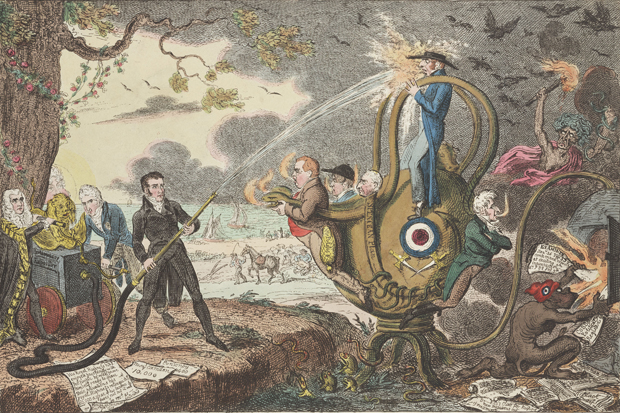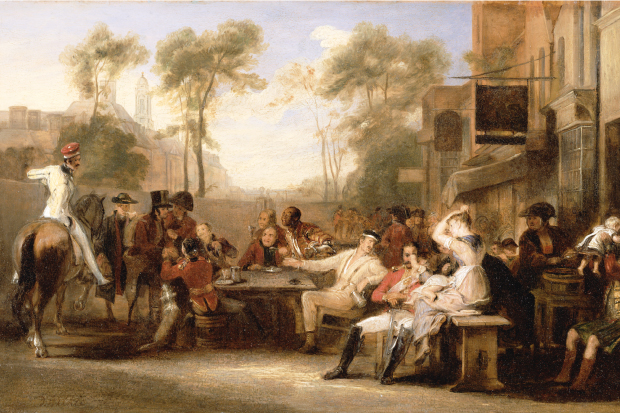The whole idea of capitalism, according to Enlightenment philosophers, was that it created a positive spiral of moral behaviour. ‘Concern for our own happiness recommends us to the virtue of prudence,’ wrote Adam Smith. ‘The profits of commerce,’ according to David Hume, carry us towards a state in which ‘the tempers of men, as well as their behaviour, refine apace.’ In the first chapter of Forging Capitalism, Ian Klaus encapsulates this theory as an 18th-century artist might have titled an allegorical painting of intertwined figures: ‘Commerce encouraging Virtue, and Virtue harnessing Commerce.’
But that’s not really the way it was, Klaus goes on to argue — and certainly not the way it is today, he implies. In this study of the development of high finance and international trade in England from the end of the Napoleonic wars in 1814 to the outbreak of the first world war a century later, the author tells us that the gentlemanly capitalism we were brought up to believe in was, if not wholly mythical, a sideshow in a noisy cavalcade of fraud, theft and what Walter Bagehot called ‘ingenious mendacity’ on all sides. ‘If polite Victorians — honest, sexless, Christian — still live in your historical cupboard, throw them out.’
Instead, he says, we should return to the pages of Dickens and Trollope to remind ourselves that there were wrong ’uns at every level and turn of 19th-century commerce, from crooked agents, clerks, brokers and jobbers to ‘lords on the take, knights on the make’ — and that ‘the thieves were often difficult to distinguish from the legitimate’, to the cost of the ill-informed and gullible investor and customer. This version of capitalism’s history is all about trust, or lack of it: market developments are driven by a continuing battle against dishonesty, in which ‘participants… are increasingly forced to refine their means of trust’.
Klaus is a former Harvard scholar who now works in the US State Department. He is also an adherent of the school — pioneered by David Kynaston over here and Steve Fraser, author of Wall Street, over there — that believes business history contains at least as many colourful characters and happenings as any other branch of the past, and deserves to be told that way. He is an entertaining writer, and Forging Capitalism is a compendium of vivid anecdotes — but they are drawn into an ultimately rather depressing thesis, that ‘vice is endemic in western capitalism’.
We begin in 1814 with a highly organised false rumour of the death of Napoleon which caused a spike in the price of the ‘Omnium’ (a bundle of government stocks) to the advantage of, among others, Lord Cochrane, a naval commander whose life was a mixture of ‘bravery, controversy, daring and greed’; not an especially wealthy man, he was holding the then enormous sum of £139,000 of Omnium on the day of the fraud.
Next we meet Sir Gregor MacGregor, an adventurer who in the 1820s invented his own Central American kingdom of ‘Poyais’ and raised bond issues in London in its name. Here in the mid-century are Beaumont Smith, forger of Treasury Bills, and Walter Watts, clerk of the Globe Insurance Company, who embezzled tens of thousands which he invested in West End theatres. Later we meet flamboyantly dishonest ‘company promoters’ such as Horatio Bottomley and Whitaker Wright (Klaus might profitably have diverted into more detail about them and their ilk) and a pioneer of financial journalism, Harry Marks, who shamelessly promoted a gold-mining stock of which he was himself a significant holder. Finally, in the arena of the transatlantic cotton trade, there are widespread frauds perpetrated by, among others, one John W. Knight of Selma, Alabama, based on false bills of lading.
The narrative linking these miscreants is one in which the exchanges and companies at the front line of commerce and finance gradually organise themselves against fraud by adopting better systems of verification of documents and counterparties, higher expectations of veracity in company prospectuses, and stricter management procedures, both internally and in relation to agents acting at a distance. We know from modern experience that ‘rogue trading’ and mis-selling are always with us, however tight the rules, but ardent free-marketeers might argue that they are exceptional rather than endemic, and that the advances Klaus chronicles were a natural consequence of the expanding scale and complexity of 19th-century trade, in which the handshake and caveat emptor of the 18th-century coffee house were no longer sufficient; that for every dozen cheats, another historian might salute three dozen ‘polite Victorian’ entrepreneur-philanthropists who proved the opposite.
But if the vision of ‘commerce encouraging virtue’ is very much on trial today, Ian Klaus certainly makes an elegant case for the prosecution.
Got something to add? Join the discussion and comment below.
Get 10 issues for just $10
Subscribe to The Spectator Australia today for the next 10 magazine issues, plus full online access, for just $10.
Available from the Spectator Bookshop, £16.99 Tel: 08430 600033
You might disagree with half of it, but you’ll enjoy reading all of it. Try your first month for free, then just $2 a week for the remainder of your first year.















Comments
Don't miss out
Join the conversation with other Spectator Australia readers. Subscribe to leave a comment.
SUBSCRIBEAlready a subscriber? Log in